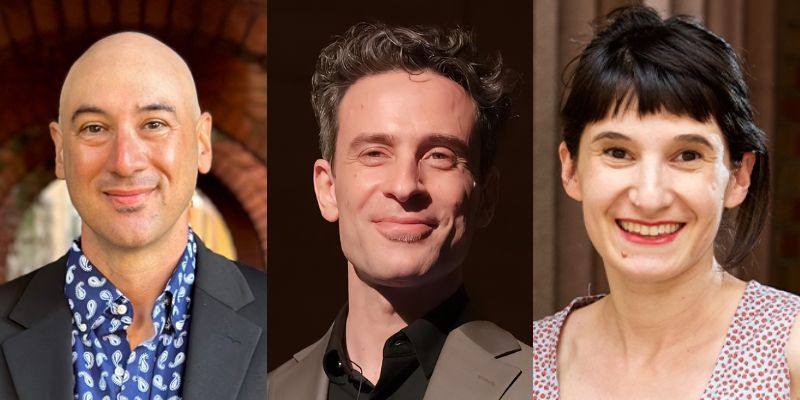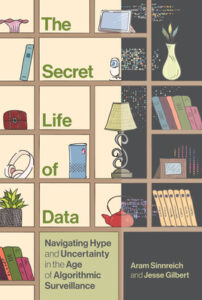238. Aram Sinnreich and Jesse Gilbert with Daniela Rosner: The Secret Life of Data
Town Hall Seattle Science Series
Release Date: 09/23/2024
 254. Psychedelic Law & Nature: What Can Americans Use Legally? Perry Salzhauer, Daniel Shortt, and April Pride
254. Psychedelic Law & Nature: What Can Americans Use Legally? Perry Salzhauer, Daniel Shortt, and April Pride
Town Hall Seattle Science Series
Seattle’s 2021 ordinance decriminalized entheogens — plants and fungi that contain psychoactive indolamines, tryptamines, or phenethylamines—such as psilocybin mushrooms, ayahuasca, mescaline cacti, and iboga. This Salon weaves together two threads: the little-known plant and fungal allies often left off the psychedelic main stage, and the laws that shape how we can (and cannot) work with them today. Legal experts Perry Salzhauer and Daniel Shortt explore what this ordinance means in practice, including how it shapes access, cultivation, and community use of approved entheogenic plants...
info_outline 253. Therese Huston with Katy Sewall: Everyday Strategies for a Sharper Mind
253. Therese Huston with Katy Sewall: Everyday Strategies for a Sharper Mind
Town Hall Seattle Science Series
Your brain has a favorite beverage, a surprising way to add new neurons, and strong opinions about multitasking—and it’s not what you think. In this engaging conversation, cognitive scientist Therese Huston and podcast host Katy Sewall unpack the small changes, many of which take 5 minutes or less, that can keep your brain sharp and your body calm. Based on Huston’s new book Sharp, they’ll explore topics like how to turn a scattered mind into focused energy and why switching doctors, while annoying, might be your secret weapon for your health. This is a night filled with...
info_outline 252. Psychedelic Salon: Psilocybin & Menopause: With Dr. Patricia Singh, Kelly McGinty, and April Pride
252. Psychedelic Salon: Psilocybin & Menopause: With Dr. Patricia Singh, Kelly McGinty, and April Pride
Town Hall Seattle Science Series
Menopause is often portrayed as a period of decline, but what if it could be reframed as an awakening? Join co-authors Dr. Patricia Singh, psychotherapist and psychedelic integration specialist, and Kelly McGinty, nurse practitioner specializing in hormonal and integrative wellness, for a groundbreaking exploration of menopause as a transformative threshold. This session will delve into how psychedelics, especially psilocybin, offer a radical new perspective, easing cognitive rigidity, reducing internal narratives of decline, and fostering emotional and spiritual growth. Attendees will gain...
info_outline 251. Dr. Shelley Sella with Amelia Bonow: Beyond Limits — Stories of Third-Trimester Abortion Care
251. Dr. Shelley Sella with Amelia Bonow: Beyond Limits — Stories of Third-Trimester Abortion Care
Town Hall Seattle Science Series
For 20 years, Dr. Shelley Sella saw patients whose diverse backgrounds and circumstances led them to the same difficult decision: to end their pregnancies. In her new book, Beyond Limits, Sella draws from her experiences to offer a window into a typical week at her clinic, weaving together patient stories—including those of a mother navigating a devastating prenatal diagnosis, a woman confronting unexpected test results after IVF, and a parent weighing safety and stability for her existing children. Dr. Sella offers a testament to a standard of care grounded in competence, compassion,...
info_outline 250. Patricia Ononiwu Kaishian with Taha Ebrahimi: Forest Euphoria: The Abounding Queerness of Nature
250. Patricia Ononiwu Kaishian with Taha Ebrahimi: Forest Euphoria: The Abounding Queerness of Nature
Town Hall Seattle Science Series
It’s only human to project the notions we already hold onto the world around us. We want to feel connected, and we start from what we know – categories, similarities, rules, expectations. But nature is endlessly expansive, at once wildly different from the societies we are used to and yet surprisingly similar to the nuances we hold as individuals. In her debut book Forest Euphoria: The Abounding Queerness of Nature, author Patricia Ononiwu Kaishian invites readers to wander off the prescribed trails and embrace the full range of what we can take away from unexpected corners of the...
info_outline 249. Blaise Agüera y Arcas with Charles Mudede: What Is Life? Evolution as Computation
249. Blaise Agüera y Arcas with Charles Mudede: What Is Life? Evolution as Computation
Town Hall Seattle Science Series
Explaining how and why our world works the way it does touches on so many fields of science: biology, chemistry, physics, and, of course, technology. However, according to researcher Blaise Agüera y Arcas, computation should also be part of the understanding of life on all levels – and going back further than one might think. In What Is Life? Evolution as Computation, Agüera y Arcas uses computation as a means of examining the complexities of our own universe. Inspired by the work of quantum mechanics pioneer Erwin Schrödinger, he revisits the question that has showcased the...
info_outline 248. Mariah Blake with Mónica Guzmán: A Legacy of Chemicals & Cover-Ups
248. Mariah Blake with Mónica Guzmán: A Legacy of Chemicals & Cover-Ups
Town Hall Seattle Science Series
From Silent Spring to Erin Brockovich, people have been captivated — and devastated — by stories of harmful chemicals and the many ways that they have altered and even ended human lives. From investigative journalist Mariah Blake comes a new book that recounts a small town being poisoned, a corporate cover up, and a grassroots movement to fight back. In 2014, after losing several friends and relatives to cancer, an insurance underwriter in Hoosick Falls, New York, suspected that the local water supply was polluted. When he tested his tap water, he discovered dangerous...
info_outline 247. Dori Gillam: Get Ready for Caregiving – Yours, Mine and Theirs!
247. Dori Gillam: Get Ready for Caregiving – Yours, Mine and Theirs!
Town Hall Seattle Science Series
Overnight, Dori became her parents’ caregiver – a labor of love that lasted for seven years. Her mom was suddenly a partially paralyzed wheelchair-bound amputee and her dad was declining due to increasing dementia. She wasn’t ready. This event is to help prepare anyone – those who have been, are now, or will be a caregiver – in other words, all of us! Whether it is navigating the health care system, working with dementia, speaking about dying, or considering how to accept care if and when you need it, you will learn from Dori’s experiences. Dori Gillam is a speaker and...
info_outline 246. Craig Mundie and Dr. Jim Heath: Artificial Intelligence, Hope, and the Human Spirit
246. Craig Mundie and Dr. Jim Heath: Artificial Intelligence, Hope, and the Human Spirit
Town Hall Seattle Science Series
Artificial intelligence is reshaping our world – but what does that mean for healthcare, scientific discovery, and human potential? In Genesis: Artificial Intelligence, Hope, and the Human Spirit, co-authors Craig Mundie, Henry Kissinger, and Eric Schmidt explore the profound implications of AI on society. In this collaborative event between Town Hall Seattle and the Institute for Systems Biology (ISB), Craig Mundie joins Dr. Jim Heath, President of ISB, for a thought-provoking conversation about the future of AI. They will discuss insights from the book, the opportunities and...
info_outline 245. Psychedelic Salon with April Pride and Sand Symes: The Sacred Path of Women and Psychedelics
245. Psychedelic Salon with April Pride and Sand Symes: The Sacred Path of Women and Psychedelics
Town Hall Seattle Science Series
Sand Symes, a psychedelic guide who has spent over 40 years working with women in transformational spaces and 20+ years immersed in her committed work with psychedelics, in discussion with April Pride at Town Hall Seattle. With decades of experience guiding women in transformational work, Sand brings a perspective that blends spiritual and practical insights. Rather than focusing on theory alone, she shares her experiences of how these medicines are understood and integrated in different contexts. This gathering invited participants to engage with stories, reflections, and perspectives on the...
info_outline With tech giants such as Microsoft and Amazon, Seattle will be instrumental in the future of data and its effects on society. What are the long-term consequences of humanity’s recent rush toward digitizing, storing, and analyzing every piece of data about ourselves and the world we live in? How will data surveillance, digital forensics, and AI pose new threats––and opportunities? In their new book, The Secret Life of Data, authors Aram Sinnreich and Jesse Gilbert explore what might happen with all the data that we collect.
With tech giants such as Microsoft and Amazon, Seattle will be instrumental in the future of data and its effects on society. What are the long-term consequences of humanity’s recent rush toward digitizing, storing, and analyzing every piece of data about ourselves and the world we live in? How will data surveillance, digital forensics, and AI pose new threats––and opportunities? In their new book, The Secret Life of Data, authors Aram Sinnreich and Jesse Gilbert explore what might happen with all the data that we collect.
They build on this basic premise: no matter what form data takes, and what purpose we think it’s being used for, data will always have a secret life. They show how this data can be used, by other people in other times and places, and the profound implications for every aspect of our lives––everything from our intimate relationships to our professional lives to our political systems.
Sinnreich and Gilbert have interviewed dozens of data experts to explore a broad range of scenarios and contexts. To manage these possibilities, the authors advocate for creating new laws and regulations, ethics and aesthetics, and models of production. In the face of technological uncertainty, Sinnreich and Gilbert invite us to play an active part in shaping how data influences our lives, both here in Seattle, and the world at large.
Aram Sinnreich is an author, professor, and musician. He is the Chair of Communication Studies at American University. His books include Mashed Up, The Piracy Crusade, The Essential Guide to Intellectual Property, and A Second Chance for Yesterday (published as R. A. Sinn).
Jesse Gilbert is an interdisciplinary artist exploring the intersection of visual art, sound, and software design at his firm Dark Matter Media. He was the founding Chair of the Media Technology department at Woodbury University, and he has taught interactive software design at both CalArts and UC San Diego.
Daniela Rosner is a Professor in the Department of Human Centered Design and Engineering (HCDE) at the University of Washington, co-director of the Tactile and Tactical Design Lab, and co-director of the HCDE Masters Program. She holds adjunct appointments in the Department of Gender, Women, and Sexuality Studies (GWSS), the Department of Digital Arts and Experimental Media (DXArts), and the Allen School for Computer Science and Engineering (CSE). Her work uses modes of design inquiry to examine sites of innovation practice and performance historically elided by technology cultures.

